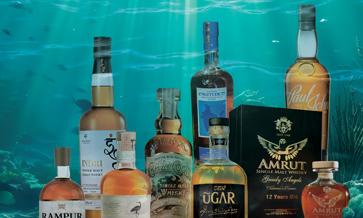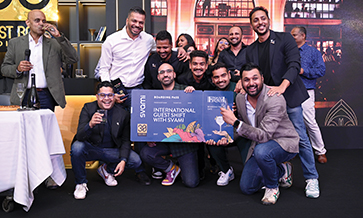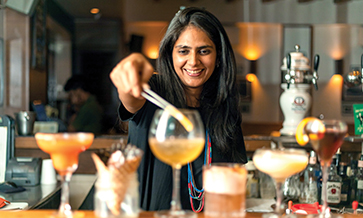Setting up a new distillery, or even buying an existing one, is an expensive proposition: at least Rs 10 crore in capital expenditure, not to mention cost of land/ lease, excise department permissions and liquor-vending permits, and staff salaries.
Rakshay spoke about an asset-light approach to distilling, where an entrepreneur ties up with an existing distillery with the relevant machinery and capacity, the requisite excise permissions, and have it distill your product for you!
“I think we’ve seen successful brands across the world not own a single distillery and become global brands. In Scotland, you see some distilleries that are doing 1,000 cases a month and own their distillery,” Vidur pointed out. “But you also have bohemian brands that never owned a distillery. So it really is how you toe the line for yourself.”
Mrinal Manu has inherited a big production facility in Goa, Blue Ocean Beverages, and expanded the company’s portfolio with Mr Jerry’s bottled cocktails. Does he find it easier producing for other brands, where he doesn’t have the stresses and complications involved with marketing and branding?
“I wouldn’t say it’s easier per se. I wouldn’t say that is always the best thing to do. You always want to have your own brands you’re passionate about doing things in the industry coming up with creative products,” Mrinal said.
“But if a great brand is coming to you, and you connect and understand the concept, and feel that you’re on the same page, then it makes a lot of sense to work with them,” he added.
Choosing partners
But what is Mrinal’s screening process? He says the first thing is compatibility with the person, especially when looking to work with new brands. “Secondly, you might be already contract bottling for other people. So there should not be a conflict of interest; you cannot violate a contract because it’s going to end up in murky waters.”
Rakshay asked to know what the risks are for producing for external parties. “How much control do you give? What if something happens that you did not foresee? What and how are the liabilities dealt with?”
Mrinal said that distilling contracts always have to be very clear and concise. “There are risks that come with it, because the license is yours. Normally there are deposits and things like that which kind of covers for breaches; but they don’t really protect you. It would be best to have a very good lawyer!” he remarked.
Is there potential of conflict between the production facility and the brand, especially if the former wanted to start a similar brand in the same spirit category?
Vidur replied: “There is enough space in that, whether you have a manufacturing facility or not. The growth in alcoholic beverages in India and production capacities are increasing. People are going to start their own brands. You just have to be prepared for it.”
Rakshay asked Mrinal and Vidur: What are some of the most favourable states to set up your own distillery?
Apart from Goa, similar ease of working is afforded by Assam and some states in the East, according to Vidur. Mrinal said: “I know Goa excise, I know how it works. We have been here for a long time. We do a lot of operations in Karnataka so, yes, we have dealt with and worked with Karnataka excise too.”
According to Mrinal, getting good business is what would matter. “Excise regulations and taxation is always going to be there: sometimes it’s going to be a disadvantage but you can’t complain about it. It’s part of your business and you have to deal with it.”
Plug-n-play
Rakshay himself launched Maya Pistola Reposado recently, made from agave cultivated in parts of Andhra Pradesh. How has his journey been in this space?
“I tied up with two different distilleries: one that did all my sourcing and agave distillation (in Andhra Pradesh), and another to do all my filtration, blending, aging and bottling (in Goa),” he said.
For him, moving the agave pinas (each weighing more than 150 kg) over a distance for processing and distillation did not make sense. And Goa’s entrepreneur-friendly excise regulations helped him choose his bottling partner. Moving forward – and provided the North Indian market accepts his product – Rakshay would like to have a bottling plant closer to Delhi, perhaps in Punjab.
Vikram Achanta asked: Is the plug-and-play option a better thing? Would setting up a common bottling unit is easier, or do brands work separately? According to Mrinal, there are many advantages when one wants to experiment with a new product or a new category. “You’re talking about very small volumes. You don’t know which state is going to work and which will not; what rules are going to change in the time that you’re trying to experiment with your product.”
Blue Ocean Beverages has two facilities (one each in Karnataka and Goa), but it still ties up with bottling partners in other states. “You need to have the plug-and-play option. But once your numbers are good enough, you move on do your own setup,” Mrinal added.
For Vidur “it’s a volume question, there’s the innovation question, and there are concerns about quality of your product”. A plug-and-play model may not work equally for every manufacturer who is either starting out or is going to create a new variant of a brand.
For the full fireside chat, visit Brews&Spirits Expo on YouTube.
https://www.youtube.com/watch?v=4tH7hVKbPX0&t=47s














